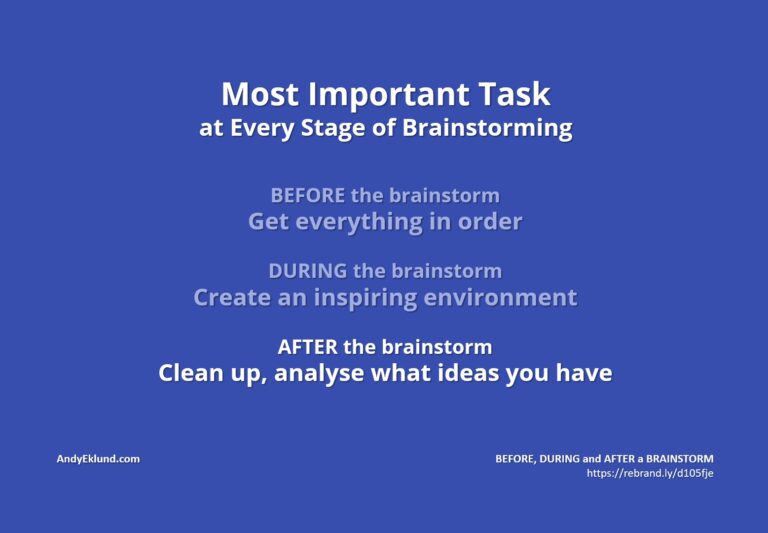This article begins a three-part series on the basics of brainstorming, organised by what to do …
Before the Brainstorm (click here)
During the Brainstorm (click here)
After the Brainstorm
While these lists may seen extensive, pick and choose what makes sense based on the size of the project, the team of people, how much time you may have, and any other consideration specific to your organisation or situation.
In particular, the tasks after the brainstorm can be broken down even further, outlined in Finishing a Brainstorm.
- Clarify (Creative criteria)
- Amplify (Make ideas better)
- Verify (Ensure the ideas do what they need to do, like get rid of the problem)
No. 1 Task for AFTER the Brainstorm: Clean Up and Analyse What Ideas You Have
Here are the basic tasks to do after the brainstorm, with the primary objective to inspire creativity and minimise all negativity.
Step 1: Clean up the flipcharts
Ask the group to bring order. Review flipcharts and add words or additional thoughts to clarify any ideas.
Step 2: Review the ideas strategically.
Do you have ideas …
- that may help achieve the objective?
- that address, eliminate or neutralise the central problem?
- that support an individual strategy (which also address a specific issue)?
- that meet the creative criteria?
Step 3: Review the ideas creatively
Do you have ideas …
- that keep repeating?
- that are complementary, or chronological?
- that take the thinking in a whole new direction?
- that suggest potential big ideas which need more depth?
- that suggest potential themes or slogans?
- that are beyond the scope of the brainstorm – but deserve more consideration?
Step 4: Keep brainstorming
Focus idea generation to fill in or address areas where you have holes. Build upon the best ideas, improve average ideas, merge and combine ideas to make better ideas.
Do you brainstorm now, or later? It’s up to you if you keep brainstorming now, or schedule another time (with different people?) in the near future. Try not to lose momentum.
Step 5: Sort, prioritise and vote
Again, clean up the flipcharts and organise the ideas. Sort and prioritise. Review the objective, central problem and key issues, as well as the creative criteria. Invite participants to vote only for a select few (only 5?).
Step 6: Determine next steps and assign action items
Be specific. Who does more research? Should someone check in with the sponsor or client? Who talks to the target audience? Shall someone start organising the content into a presentation structure? Again, be specific. Assign people and dates. Use peer pressure to enforce responsibilities.
Step 7: Thank everyone, and reward the group
Sometimes Brainstorms Go Badly
Of course, it would be fantastic if every brainstorm was a smashing success, but many are not. If you find yourself at the end of a bad brainstorm, here are some suggestions what to do next if your ideation session isn’t successful.
What other tasks have you conducted once the brainstorm is finishing? Please add your thoughts and comments below.



No comment yet, add your voice below!